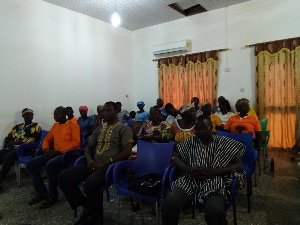 Some participants at the sensitization meeting
Some participants at the sensitization meeting
A research conducted by the Coalition for the Advancement of Organic Farming (CAOF), a Non-governmental Organization (NGO), has revealed that in spite of the declaration by the African Union for all member countries to mainstream Ecological Organic Agriculture practices into national policies, Ghana had not yet developed a specific policy on organic agriculture.
CAOF which has a membership of 17 Non-Governmental Organizations working closely with farmers in Ghana to promote organic farming in the country conducted the research on “the Extent to which Organic Agriculture has been considered in current Government’s Agriculture Policies and Programmes in Ghana under the Appropriate Inputs and Certification for Organic Farming Project”, in some selected Districts in the Upper East and Northern Regions.
Among some of the District the research was conducted included the Bongo District, Bolgatanga Municipal. Nabdam District, Talensi District, Bulisa South District, Bulisa North District, Garu/Tempane District, Binduri District, Kasena Nankana East District and Navrongo Municipal in the Upper East Region.
Others included the Bunkpurugu/Yunyoo District, Tamale Metropolis, West Mamprusi District, East Mamprusi District and the Gushiegu/Karaga District in the Northern Region.
Funded by the Business Sector Advocacy Challenge (BUSAC) Fund and its development partners DANIDA, European Union and USAID, the research also established that even though Ghana in recent times has formulated and implemented some policies, plans and programmes, there was no specific consideration of organic agriculture in such policies, plans and programmes.
“The Food and Agriculture Sector Development Policy and Medium-Term Agriculture Sector Investment Plan lightly mentioned organic agriculture and recognized the need for Ghana to own a policy on Ecological Organic Agriculture. It is also significant to note that Ghana has not yet developed a specific policy or plan on organic agriculture despite the declaration by the African Union which requires all member countries to mainstream Ecological Organic Agriculture practices into national policies by 2025”, the research pointed out.
The research which was made known at separate sensitization forums in the Northern, Upper East and Upper West regions to share the findings also pointed out that the current government policies and plans such as the, Planting for Food and Jobs, One District One Factory, One Village, One Dam among others failed to prominently feature organic agriculture especially in terms of inputs support and certification.
The research also revealed that organic agriculture practices in Ghana was considered to be mainly farmer and private sector initiative with no full-scale support from the government.
It added that since the launch of the fertilizer subsidy programme in 2008 by the government, it was only in the 2016 and 2017 farming seasons that smaller quantity of organic fertilizer was considered under the programme.
“In terms of the Fertilizer Subsidy Program, there was evidence that pointed to the fact that fertilizer application among farmers increased from 8kg per hectare in 2008 to 12 kg per hectare in 2013. However it was only in the 2016 and 2017 farming seasons that smaller quantity of organic fertilizer was considered under the programme”, it stressed.
The research further noted that even though through an FAO funded project, an Organic Desk was established at the Ministry of Food and Agriculture responsible for spearheading organic agriculture related activities, there was no specific Organic Agriculture Desk at the Departments of Food and Agriculture in seven districts and two regional MOFA offices that the research contacted.
‘’From the research, private sector led initiative to ensure that Ghana implements the African Union Declaration on Ecological Organic Agriculture was described as weak. Added to this was the fact that only a few private sector operators were aware of this declaration”, the research indicated.
It noted that even though the Ghana Standard Authority was in charge of standards and guiding organic certification, organic Codes of Practice and certification of organic produce, such mandate was still under review.
The Coordinator of CAOF, Mr. Gerard Lapointe Agana explained that among the key objectives was to establish the extent to which organic agriculture has been considered in current government policies, plans and programmes on agriculture.
He indicated that now the research had established the fact that to a very large extent, current government policies, plans and programmes on agriculture have not given considerations to organic agriculture, the findings would be used as an advocacy tool to engage policy makers and the government to give very serious attention to the sector.
The Monitor of the BUSAC Fund, Mr Vincent Subbey in his contribution said the Coalition as a start, must embark on more sensitization and education of the populace on the importance of organic agriculture which will lead to organic movement and grassroots-based organic food production, consumption and marketing using local organic market outlets. He added that, this will assist especially smallholder farmers in converting to organic agriculture products and with increasing demand and patronage lobby government for legislation regarding organic inputs and certification.










